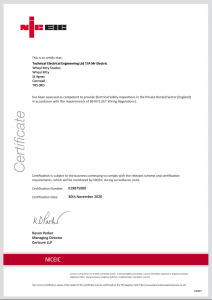ELECTRICAL SAFETY IN A HOLIDAY LETTING PROPERTY:
As an owner, you are required by law to adhere to the necessary electrical safety regulations as set out in current standards as governed by the Electricity at Work Regulations (1989).
The legislation states that all electrical systems in a property must be maintained to avoid danger to all who use the premises.
Electrical safety in any home is essential, and if you are a holiday let owner you have a duty of care to ensure that all electrical appliances, circuits, and fixed installations within your property are safe and compliant with current regulations.
As well as peace of mind for you (your family) and your guests, if you are confident your property complies with electrical safety regulations, you’re also preventing potential injury to guests and your own liability.
“As a responsible holiday let owner you can’t afford to be complacent where electrical safety is concerned.”
ELECTRICAL INSTALLATION CONDITION REPORTS (EICR) FOR HOLIDAY LETS:
New regulations for all private rental landlords on electrical safety for property letting came into force on 1st June 2020 and all privately rented properties must have, by 1 April 2021 a valid EICR (Electrical Installation Condition Report) in place.
Although it is not yet a legal requirement for holiday homes, it is an urgent reminder that as a holiday let owner you are required by law to ensure that all electrical appliances, circuits, and fixed installations within your holiday let are safe and are not hazardous to your guests.
An Electrical Installation Condition Report [EICR] is the best documented way to ensure your properties electrical installation is safe and satisfactory.
“Basically, you don’t have to have an EICR by law, but there is a LAW that you need to ensure your electrical installation within the property is maintained to avoid danger to all who use the premises.”
WHAT IS AN ELECTRICAL INSTALLATION CONDITION REPORT?
An EICR is a documented account produced by a qualified and competent electrical engineer, as part of a detailed inspection of the quality of the ‘fixed’ and permanently connected electrical installations in a property. This will include wiring, plug sockets, light fittings and consumer units, showers, extractors, and fixed appliances. A bit like an MOT for your home electrics.
The EICR will identify if there are any hazardous faults, defects, and electrical safety problems in a home.
During the inspection, your chosen electrical engineer will check the condition of your electrical installations against the BS 7671 IET Wiring Regulations (the UK standard for the safety of electrical installations).
FOLLOWING AN ELECTRICAL INSTALLATION CONDITION REPORT?
Following the inspection, your chosen electrical engineer will report on any electrical works in a priority order that are needed to maintain guest safety and prevent property damage.
You can then rest in the knowledge that you have an EICR official certificate from a qualified professional, which you can show to tenants, local authorities, or Insurance companies if any electrical issues arise.
Mr. Electric is also proud to be a member of the NICEIC and is accredited as Contractor, Domestic Installer and under their new PRS (Private Rented Sector) Scheme.

PORTABLE APPLIANCE TESTING [PAT] FOR HOLIDAY LETS:
Your duty of care applies to both installed and portable electrical appliances, for which you should also undertake regular Portable Appliance Testing (PAT).
PAT testing is the examination of electrical appliances, in your holiday home, checking them for safety from potential defects and hazards, through a series of visual inspections and electronic tests.
This includes anything you plug in – such as toasters, kettles, televisions, Phone Chargers, music systems, coffee machines, computer systems or hair dryers.
Best practice is to have a qualified PAT testing carried out on an annual basis. Again, this proves you take electrical safety seriously, and there is a clear record (usually stuck to the appliance) of when the test was carried out.






